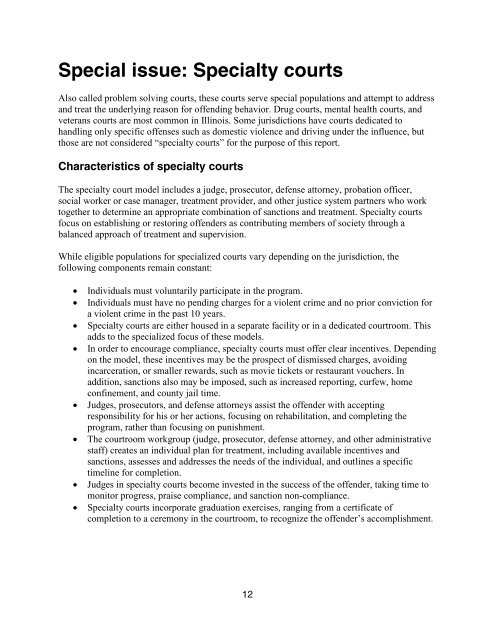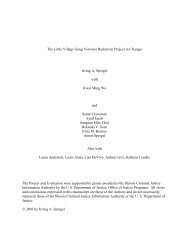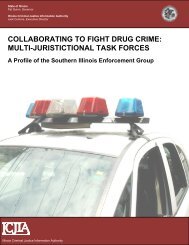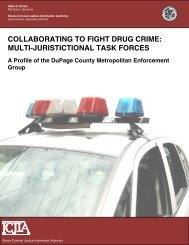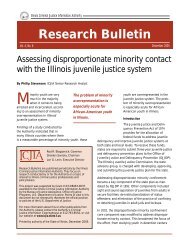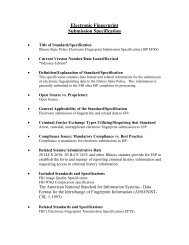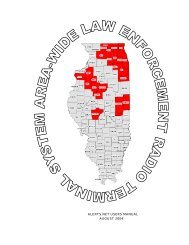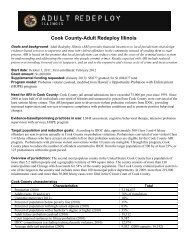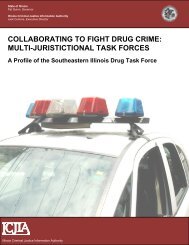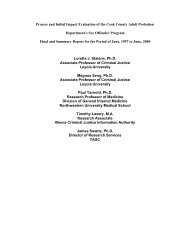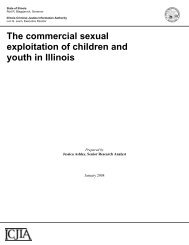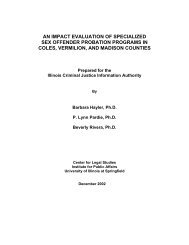policies and procedures of the illinois criminal justice system
policies and procedures of the illinois criminal justice system
policies and procedures of the illinois criminal justice system
You also want an ePaper? Increase the reach of your titles
YUMPU automatically turns print PDFs into web optimized ePapers that Google loves.
Special issue: Specialty courts<br />
Also called problem solving courts, <strong>the</strong>se courts serve special populations <strong>and</strong> attempt to address<br />
<strong>and</strong> treat <strong>the</strong> underlying reason for <strong>of</strong>fending behavior. Drug courts, mental health courts, <strong>and</strong><br />
veterans courts are most common in Illinois. Some jurisdictions have courts dedicated to<br />
h<strong>and</strong>ling only specific <strong>of</strong>fenses such as domestic violence <strong>and</strong> driving under <strong>the</strong> influence, but<br />
those are not considered “specialty courts” for <strong>the</strong> purpose <strong>of</strong> this report.<br />
Characteristics <strong>of</strong> specialty courts<br />
The specialty court model includes a judge, prosecutor, defense attorney, probation <strong>of</strong>ficer,<br />
social worker or case manager, treatment provider, <strong>and</strong> o<strong>the</strong>r <strong>justice</strong> <strong>system</strong> partners who work<br />
toge<strong>the</strong>r to determine an appropriate combination <strong>of</strong> sanctions <strong>and</strong> treatment. Specialty courts<br />
focus on establishing or restoring <strong>of</strong>fenders as contributing members <strong>of</strong> society through a<br />
balanced approach <strong>of</strong> treatment <strong>and</strong> supervision.<br />
While eligible populations for specialized courts vary depending on <strong>the</strong> jurisdiction, <strong>the</strong><br />
following components remain constant:<br />
• Individuals must voluntarily participate in <strong>the</strong> program.<br />
• Individuals must have no pending charges for a violent crime <strong>and</strong> no prior conviction for<br />
a violent crime in <strong>the</strong> past 10 years.<br />
• Specialty courts are ei<strong>the</strong>r housed in a separate facility or in a dedicated courtroom. This<br />
adds to <strong>the</strong> specialized focus <strong>of</strong> <strong>the</strong>se models.<br />
• In order to encourage compliance, specialty courts must <strong>of</strong>fer clear incentives. Depending<br />
on <strong>the</strong> model, <strong>the</strong>se incentives may be <strong>the</strong> prospect <strong>of</strong> dismissed charges, avoiding<br />
incarceration, or smaller rewards, such as movie tickets or restaurant vouchers. In<br />
addition, sanctions also may be imposed, such as increased reporting, curfew, home<br />
confinement, <strong>and</strong> county jail time.<br />
• Judges, prosecutors, <strong>and</strong> defense attorneys assist <strong>the</strong> <strong>of</strong>fender with accepting<br />
responsibility for his or her actions, focusing on rehabilitation, <strong>and</strong> completing <strong>the</strong><br />
program, ra<strong>the</strong>r than focusing on punishment.<br />
• The courtroom workgroup (judge, prosecutor, defense attorney, <strong>and</strong> o<strong>the</strong>r administrative<br />
staff) creates an individual plan for treatment, including available incentives <strong>and</strong><br />
sanctions, assesses <strong>and</strong> addresses <strong>the</strong> needs <strong>of</strong> <strong>the</strong> individual, <strong>and</strong> outlines a specific<br />
timeline for completion.<br />
• Judges in specialty courts become invested in <strong>the</strong> success <strong>of</strong> <strong>the</strong> <strong>of</strong>fender, taking time to<br />
monitor progress, praise compliance, <strong>and</strong> sanction non-compliance.<br />
• Specialty courts incorporate graduation exercises, ranging from a certificate <strong>of</strong><br />
completion to a ceremony in <strong>the</strong> courtroom, to recognize <strong>the</strong> <strong>of</strong>fender’s accomplishment.<br />
12


